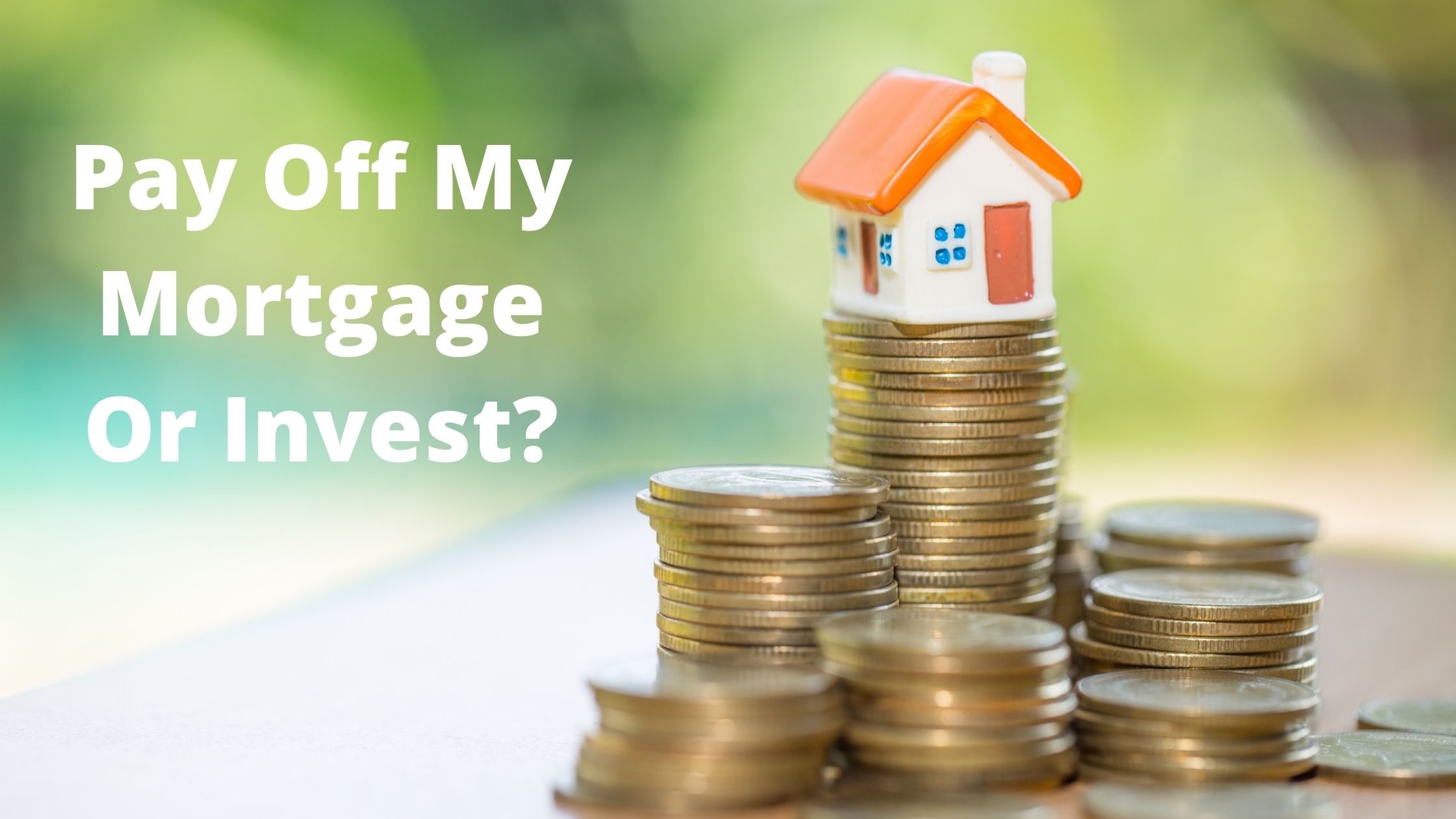Last Updated on January 10, 2021 by Emma
Should I pay off my mortgage or invest the money and aim to grow it? It’s one of the questions most of us ask as we reach financial maturity. The answer is that you should do both, but the extent to which you focus on each option depends on your attitude to risk and debt.
This post may contain affiliate links. If you decide to use them, my blog may earn a small commission at no additional cost to you, helping to fund more helpful articles for you to enjoy. You can find out more in my Affiliate Disclosure. Nothing in this article constitutes financial or other advice. These are my views and the results of years of research, testing, and learning.
Table of Contents
Why pay off your mortgage early?
There are a range of reasons why you may decide to pay off your mortgage early. Your mortgage tends to be your largest financial commitment, and if you can clear or reduce that ongoing payment, you suddenly have far more freedom to decide what work you do and how much you need to earn.
Keeping a mortgage also costs money in terms of the interest you pay monthly. According to research from thesimpledollar.com:
“With the average interest rate on a 30-year, fixed-rate loan sitting at 4.44% as of this writing, someone purchasing a median-priced home with a typical 20% down payment would owe $169,390 in interest over the 30-year life of their mortgage — or $5,646 a year in interest.”
That’s a lot of money to throw away.
For individuals on an interest-only mortgage, the situation can be starker in times of high-interest rates, albeit that is not the case when writing this article.
Other people feel more content and have more peace of mind knowing they own the property they live in. They then also fully own an asset that will hopefully appreciate in value over time. For example, my personal residence’s value has doubled in seven years, which isn’t a bad return!

What are the advantages of not paying off my mortgage early?
The advantages if you don’t pay off your mortgage early include:
- The ability to pay off debts with higher interest rates. For example, the average mortgage rate was 3.25% to 3.56% in the UK in 2020, according to the Moneyfacts Treasury Report. In the US, 30-year fixed-rate mortgages fell to an all-time low several times in 2020, dropping to 2.72% in November 2020, according to reports by Bloomberg. Compare this low rate of borrowing against the relatively high-interest rates associated with credit cards of 18% plus. The APR you receive typically depends on your credit score and the introductory offers available on credit cards.
- In the US, the interest you pay on mortgage payments is tax-deductible if you itemise the deductions on your tax return. It’s best to seek guidance from a tax professional if you have questions regarding the benefits of a mortgage interest tax deduction based on your personal tax rate.
- You’ll gain more flexibility as an investor, due to having less of your personal finance tied up in your home. The more you pay toward your mortgage, the less extra cash you have available to invest in other things, which may deliver a better, or worse, financial return.
- If you have a high risk tolerance, you may find paying off low-interest debt is not in line with your financial ambitions.
Why invest?
Investing involves putting your money into shares, property, financial schemes, or even a business, with the aim of making a profit.
The case for investing money is relatively well known. Once you consider the cost of inflation, which is how fast prices are rising each year, if you hold money in a savings account or under your mattress, the value of that cash will decline over time.
Let’s compare that with the picture if we invest that money in the stock market. According to data from Goldman Sachs, the S&P 500 index has delivered an average return of 13.6% over the decade 2010 to 2020. If you kept $100 under your mattress in the same decade, due to inflation, its buying power would have dropped to $82.99. Of course, stock market returns are risky, and there’s the potential to lose money if you sell your stocks when the market is down.
The track record of growth in the stock market is why 401k and pension funds tend to invest in it in various forms, especially in the holder’s younger years when they have time to weather the market’s ups and downs. As individuals come closer to retirement, pension funds tend to invest more of the money in bonds with a fixed rate of return and, therefore, less risk.
What are the downsides of investing?
The main challenge when investing concerns risk. The opportunities that are attractive due to potential high returns may have a high degree of risk attached to them, whether that’s placing your money in shares, buying a failing business and turning it around, or perhaps building a property portfolio. In each scenario, there are different types and levels of risks. It’s important to understand your attitude to risk and to have the full information on the risks associated with any investment before you make a decision.
One way to get clear on your attitude to risk is to work with a financial planner who can complete a personal finance review with you, help you to understand your personal attitude to risk, and the investment options that fit best within that.

When should I invest?
With investing, you benefit from the power of compound interest. The longer you hold your money in an investment, the more interest you earn on interest! Therefore, someone who invests $100 or perhaps £1000 in their early 20s is more likely to see higher growth in their money than someone who invests the same amount in the same investment at a later age.
Is paying off your mortgage a better financial decision than investing?
When considering how best to allocate your financial resources between paying off a mortgage and investing, consider any other debts you may be carrying.
For example, suppose you have an interest-bearing credit card. In that case, you could be paying an interest rate of 18% plus, which is likely to be way more expensive than, say, a long-term fixed-rate mortgage, and more than most stock market funds have returned on average over the longer term. I’m a fan of Dave Ramsey’s method of first saving a small emergency fund (of around $1000 or £1000), then paying off your consumer debts, then building on your emergency fund, so you have easy access to three to six months of expenses. Then comes your moment to look at saving for retirement through investing, paying off your mortgage early, and potentially saving for your kid’s education.
Whether paying off your mortgage or investing is the best option for you depends upon:
- Your existing financial situation – do you have anything saved for retirement? Does your company offer a matched 401k or pension contribution? Are you using it?
- Are you able to overpay your mortgage freely, or are you on a fixed rate that only allows specific overpayments each year, for example, up to 10%?
- What mortgage interest rate are you paying?
- What is your attitude to debt? Is it important to own your home by paying off your mortgage early? Will it bring you peace of mind and give you more options for the long term?
- What is your attitude to risk? Are you comfortable putting your money into investments that could lose or gain money?
- What are you investing for, and how long will you be able to leave the money untouched?
If you look purely at the numbers, in the current climate of lower mortgage rates and average stock market returns of around 10%, over the long term, most people will earn more through investing than they will save in mortgage interest.
For example, Investopedia outlines the case study of a 30-year loan term mortgage of $150k at 4.5%, in which paying an additional $188 a month for 20 years generates a total interest saving of $46k. Investing that overpayment of $188 for 20 years at an average 7% return each year gives you $51k, a gain of $5k over the overpayment scenario, though, of course, this comes with no guarantees. There’s also a chance that mortgage rates could increase in the period, making the total interest savings higher. The interesting piece comes when we look at the longer-term picture. Keeping up that investment rate for another decade would lead to a total investment pot of over $153k through the power of consistency and compound interest. There may be even more advantages to the investing scenario if your mortgage interest is tax-deductible.
How to decide how much to pay off your mortgage and how much to invest
There are differing views on how you best allocate your money between repaying a mortgage and investing.
The well known financial guru Dave Ramsey recommends that you initially invest 15% of your household income towards retirement. After that, direct everything else you have spare towards your mortgage (after paying off your consumer debts and building an emergency fund of three to six months of expenses). The Ramsey Group completed a study into millionaires’ financial habits in the US and found that paying off the mortgage was one of the biggest levers to them reaching millionaire status. These individuals were more concerned with becoming entirely debt-free, so they could feel more financially secure and free up more money to invest, than concerning themselves with the benefits of mortgage interest write-offs in their tax return.
The opposing view is that mortgages can be a relatively cheap way of borrowing a large amount of money as the interest is relatively low. You can compare the average US mortgage interest rate of 4.44% with the average return from the S&P 500 of 13.6% between 2010 and 2020. Looking purely at these numbers, some individuals believe they are better off investing in the stock market and hope to achieve higher returns than the money they’d save if they had less mortgage interest to pay, plus any tax advantages of the mortgage interest write-off.

Conclusion: gathering the facts and understanding the pros and cons when deciding whether to pay off my mortgage or invest
The trade-off between paying down your mortgage and retirement savings really comes to what your financial goals are and over what timeframe. You don’t have to decide to do one or the other; you can do both and adjust the allocation you pay to each over time in line with your goals and motivations.
I like to know that I am putting 20% of my income towards retirement, and then the rest goes towards the mortgage. Somehow seeing that debt go down each month fires me up to earn more, in a way that unknown earnings from adding to my investments further does not. I know that as that monthly mortgage payment gets lower and lower, I have more options for how I spend my time today and in the future.
Even if becoming entirely debt-free by paying down your mortgage is important to you, you will be throwing money away if you don’t get the benefit of a company match on your 401k or pension contributions.
Of course, nothing is guaranteed; you could pay off your mortgage and find that your home equity falls over time due to a fall in the real estate market or something that devalues your property on a local level.
The younger you are, and the sooner you start investing, the longer you have for your money to grow and get through any falls in the stock market. Market falls do happen, but you only lose money if you take out your money when the market is down. For example, my retirement savings took a 25% hit when coronavirus hit Europe and the US, but my portfolio is now at +19% at the time of writing.
If in doubt, find an excellent financial advisor who will thoroughly explain your options, rather than chase commission from your investment choices.
Frequently Asked Questions
Will I earn more money in the S&P 500 than I’ll pay in mortgage interest?
The S&P 500 is one of the most well-known indices, capturing the performance of 500 of the largest US companies. It has delivered an attractive average return rate of over 10% over the long term, which is higher than the average mortgage fixed rates currently. While you can therefore conclude that it is likely you will earn more by investing in this index than what you save if you pay off your mortgage, you also need to consider:
- Stock market performance can go up and down, and the return rate is not guaranteed, especially in the short term.
- If your mortgage is on a variable interest rate, then your mortgage’s cost may increase and decrease over time.
Where can I find out more information about whether to pay off my mortgage or invest?
Here are some of my favorite books for learning about how to manage your money and investing:
- Dave Ramsey’s Total Money Makeover
- Financial Freedom by Grant Sabatier
- Everyday Millionaires by Chris Hogan
- The Only Investment Guide You’ll Ever Need by Andrew Tobias
- The Automatic Millionaire by David Bach
What do people spend their money on after paying off a mortgage early?
Mortgage payments tend to be our most significant monthly expense, so getting rid of those can create a great sense of freedom and free up significant extra money. You potentially no longer need to feel stuck in your job or feel the pressure to earn the same amount if it is coming at a high trade-off to your health and happiness.
Alternatively, if changing your lifestyle is not a high priority, you could redirect the money into investments that align with your future goals, such as when you want to have the option to retire, and your values. For example, I am now starting to invest in ESG (Environmental, Social and Governance) funds, which favour companies with strong ethical and environmental policies. This is something I believe in strongly.
While it may make sense to treat yourself a little once you’ve paid off your home, it’s best financially to avoid ‘lifestyle creep’. That’s where the money you traditionally spent on mortgage payments disappears in your bank account, through buying more things that don’t add value to your life. An easy trick to avoid this is to redirect the money you would have spent on your mortgage to your investments, or even a savings account in the short term, automatically as soon as it comes into your account.
Should I refinance my home?
One way to get an instant boost to owning your home sooner is through changing mortgages. Suppose you have the option to switch to a significantly lower interest rate without increasing the term of your mortgage and incurring fees that wipe out the benefit of switching. In that case, this is generally a sensible option to consider. You will likely need to go through a credit approval process. Individuals with higher credit scores are likely to qualify for better mortgage rates than those with a lower credit score.
How much do I need to have invested for retirement?
For detailed insights and information, see my articles:
How much cash should I keep available if I am both repaying my mortgage and investing?
It’s sensible to have sufficient cash instantly accessible to cover you in case of an emergency, such as something breaking in your home, and in case you lose your primary source of income. However, before building up an extensive emergency fund, it makes sense to pay off expensive consumer debt first, such as credit cards (see Best Way To Pay Off Credit Card Debt).
The amount of emergency money you hold will depend on your attitude to risk, whether there are two income earners in the household and whether you have dependents. For most people, keeping cash in an instant access account of three to six months of your household expenses is generally sufficient. You should avoid taking money from retirement accounts wherever possible as there may be costs to access this money, you could withdraw money when the funds are down, and you limit the growth of your retirement accounts if you touch them.
What do you think?
Would you prioritise paying off your mortgage or investing?
We’d love to hear from you in the comments below!
If you enjoyed this article you may also like:
- How to Pay off Debt Quickly
- How Much do I Need to Have Saved for Retirement?
- When Can I Retire?
- Retirement Calculator

From my perspective, it would always make sense to pay off your mortgage first and get rid of it before redirecting your funds to investments. Chances are the cost of the mortgage will be higher than an average investment yield, unless you are for speculative income. But I am by nature risk-averse and would not personally go for it. Of course, if you have the funds to cover both, then why not. Otherwise, it would be preferable to pare down a high-cost mortgage first.
Thanks for sharing your opinion!
It’s personal choice but We aimed to pay off our mortgage as soon as we could but it wasn’t practical when our kids were going through higher education
We used redundancy pay out plus careful savings to clear the mortgage which fortunately wasn’t a very large one.
As a matter of principle I just hate owing people money
We kept a £100 loan out do the building society kept the house deeds. However when you look up the land registry you find that the mortgage provider is listed as having an interest in your property even though it’s a tiny amount. Get rid of this and pay off the outstanding sum as it simplifies any issues over inheritance
Good article with lots of great advice to suit individual cases
Thanks for taking the time to share your experiences on this topic Jonathan!
Thanks for another useful article I enjoyed reading it, helpful advice
Thanks for taking the time to comment Steve!
Overall, it depends on the entire mathematics of the situation. You have to evaluate which situation will be the most lucrative one for you. And the answer to that is very variable. It all comes down to many of the mathematical factors, for example, the APR on the mortgage, the time frame, the ROI of the potential investment. The risk/return ratio of the investment, etc. There is a lot to consider and the answer is different for each individual based on their situation. I think you’ve done an excellent job at explaining this and I appreciate this a lot
Thanks for sharing your perspective Misael! It’s a complex topic.
Your post has opened my eyes on the fact that paying off my mortgage is not always the best option. In every case we need to sit down and calculate what has higher returns and go that way. I have a good record on my credit cards and I also wanted to invest in this new year. But the idea of paying the mortgage was distracting me.
Hi Paolo! I’m so pleased to hear that this article was helpful to you.